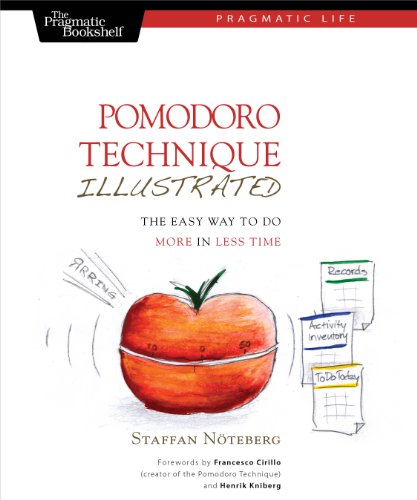
Pomodoro Technique Illustrated: The Easy Way to Do More in Less Time
- Length: 156 pages
- Edition: 1
- Language: English
- Publisher: Pragmatic Bookshelf
- Publication Date: 2010-01-07
- ISBN-10: 1934356506
- ISBN-13: 9781934356500
- Sales Rank: #82314 (See Top 100 Books)
Printed in full color.
Do you ever look at the clock and wonder where the day went? You spent all this time at work and didn’t come close to getting everything done. Tomorrow try something new. Use the Pomodoro Technique to work in focused sprints throughout the day. In Pomodoro Technique Illustrated, Staffan N teberg shows you how to organize your work to accomplish more in less time. There’s no need for expensive software or fancy planners. You can get started with nothing more than a piece of paper, a pencil, and a kitchen timer.
You have so much you need to accomplish today. Your list is a mile long and you find yourself getting interrupted every other minute. You’d like to tell everyone to leave you alone, but most of the interruptions are coming from you! You think of a phone call you need to make or a web site you need to check and before you know it you’re answering email, checking twitter, and finding a million other things to occupy your time.
You need to focus—really focus.
The Pomodoro Technique puts you back in charge of your day. You’ll apply successful techniques from software engineering to identify what you should be doing today and to help you achieve your goals. Your mind won’t wander when it is fully engaged in short bursts of focused activity.
Learn to work less and accomplish more using nothing more than paper, pencil, and a simple kitchen timer.
Set the timer and start on your next Pomodoro. When the bell rings take a break. This personal approach to timeboxing is at the core of the Pomodoro technique and this book is filled with advice on how get started and how to tailor it to your own needs.
Table of Contents
Chapter 1. One Activity At A Time
Chapter 2. Context
Chapter 3. Mechanics
Chapter 4. Interruptions
Chapter 5. Estimate
Chapter 6. Adapt
Chapter 7. Team







